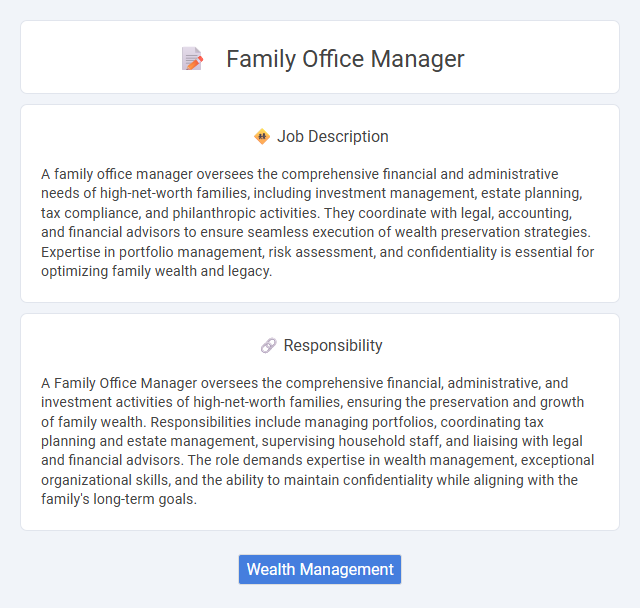
A family office manager oversees the comprehensive financial and administrative needs of high-net-worth families, including investment management, estate planning, tax compliance, and philanthropic activities. They coordinate with legal, accounting, and financial advisors to ensure seamless execution of wealth preservation strategies. Expertise in portfolio management, risk assessment, and confidentiality is essential for optimizing family wealth and legacy.
Individuals with strong organizational skills and high emotional intelligence are likely to thrive as family office managers. Those who prefer structured environments, excel in multitasking, and have a discreet, trustworthy nature may find this role suitable. Candidates who struggle with confidentiality or handling complex, multifaceted responsibilities might face challenges in this position.
Qualification
A Family Office Manager oversees the financial, legal, and administrative tasks for high-net-worth families, requiring expertise in wealth management, investment strategies, and tax planning. Professional qualifications often include certifications such as CFA, CPA, or CFP, along with experience in financial analysis, estate planning, and risk management. Strong interpersonal skills and discretion are essential to effectively coordinate with legal advisors, accountants, and other professionals while safeguarding family privacy.
Responsibility
A Family Office Manager oversees the comprehensive financial, administrative, and investment activities of high-net-worth families, ensuring the preservation and growth of family wealth. Responsibilities include managing portfolios, coordinating tax planning and estate management, supervising household staff, and liaising with legal and financial advisors. The role demands expertise in wealth management, exceptional organizational skills, and the ability to maintain confidentiality while aligning with the family's long-term goals.
Benefit
Managing a family office likely offers significant benefits such as overseeing a diverse portfolio that may enhance wealth preservation and growth. The role probably includes access to exclusive investment opportunities and personalized financial strategies tailored to multi-generational wealth. There is a high chance of enjoying a dynamic work environment with a strong emphasis on confidentiality and trust.
Challenge
Managing a family office likely involves navigating complex financial portfolios and addressing diverse client expectations, which can present significant challenges. The probability of encountering regulatory changes and shifting market conditions may require constant adaptation and strategic thinking. Balancing confidentiality with transparency also often demands high levels of discretion and professionalism.
Career Advancement
Family office managers oversee wealth management, investment strategies, and estate planning for high-net-worth individuals. Career advancement often involves gaining expertise in tax law, financial planning, and asset diversification to manage increasingly complex portfolios. Progression can lead to executive roles such as chief investment officer or director of wealth management within large family offices or private wealth firms.
Key Terms
Wealth Management
A Family Office Manager oversees the comprehensive wealth management strategy for high-net-worth families, ensuring preservation and growth of assets through investment portfolio diversification, tax planning, and estate management. Expertise in risk assessment, asset allocation, and fiduciary responsibilities drives tailored financial solutions that meet long-term family objectives. Managing multi-generational wealth requires coordination with financial advisors, legal experts, and accounting professionals to align on legacy planning and liquidity needs.
 kuljobs.com
kuljobs.com